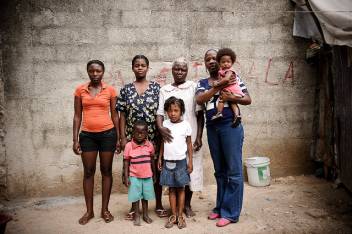 World Humanitarian Day (WHD) is celebrated internationally on 19 August to raise awareness of humanitarian work and the people who risk their lives to provide aid to people in need. This year’s campaign is about inspiring the spirit of aid work in everyone.
World Humanitarian Day (WHD) is celebrated internationally on 19 August to raise awareness of humanitarian work and the people who risk their lives to provide aid to people in need. This year’s campaign is about inspiring the spirit of aid work in everyone.
Older people make up a significant and growing number of those affected by humanitarian crises. Their age can make them amongst the most vulnerable people in disasters and crises. Yet many older people also play a valuable role that is often overlooked.
They are often the primary carers of other vulnerable people, especially children. This is particularly the case in areas where the parent generation is missing because of HIV and AIDS, economic migration or conflict and children are left in the care of their grandparents.
Older people’s role is crucial
Older people can also play an important role in household livelihoods. This may be through financial and material contributions as well as productive labour. The contribution of older people to family and household duties also often enables other household members to find employment and income for the household. Older people’s accumulated experience, knowledge and understanding also makes them a valuable resource for their communities.
The role of older people as carers and helpers of other people in displacement situations is highlighted in our recent joint report with the Internal Displacement Monitoring Centre: “The neglected generation: The impact of displacement on older people”.
At the end of 2011, 26.4 million people were internally displaced and a significant proportion of them are older people – sometimes up to 65% in certain areas. The United Nations High Commission for Refugees (UNHCR) recognises them to be among the individuals most at risk.
Older people support each other in humanitarian crises
In contexts of humanitarian crises, such as displacement, it is frequently older people themselves who must support other, more vulnerable, older people. During the Georgian conflict of 2008 for instance, those who remained in their villages during the conflict were predominately older, as they were unwilling or unable to flee with their families. Those left behind were often forced to hide in the forests at night for safety, with only their spouse or other older people for assistance and support.
When older people do reach places of relative safety, such as internally displaced persons (IDP) camps, they face a range of further barriers to accessing the assistance they need. For example, common assumptions that families and communities will support older people are often not based in reality.
Furthermore, humanitarian agencies repeatedly fail to accurately assess and respond to older people’s needs. When combined with challenges related to mobility, vision, hearing and illness, older people regularly go without essential support.
“Friends” after Haiti earthquake
At the outset of HelpAge’s response to the 2010 Haiti earthquake, we established a network of able bodied, older residents in the temporary camps known as “friends”. Using their knowledge of the community living in the camp, friends were responsible for registering older people for assistance, collecting data and providing home-based care to highly vulnerable older people, including delivering relief items provided by HelpAge.
The approach was implemented in 93 camps across affected areas of Haiti, and ensured that the most vulnerable older people, who were unable to access distribution points, were not left out.
As HelpAge’s response developed it supported older people to form older people’s associations (OPAs). These OPAs have achieved significant changes. They have, for example, successfully integrated older people into cash-for-work programmes; started literacy programmes and created cash boxes that members can contribute to in support of other members, for example to cover funeral fees.
In the most recent example of older people helping each other in humanitarian crises, older people from OPAs in the Philippines have sprung into action since the recent tropical storms caused severe flooding throughout the country at the end of July.
This WHD 2012, recognise and support older people
For humanitarian assistance to be effective, the needs of the most vulnerable, including older people, must be met. As illustrated, one key mechanism for addressing these shortfalls is to empower and enable older people to make active contributions to addressing their own needs.
This World Humanitarian Day, HelpAge would like humanitarian colleagues to join us in celebrating the valuable role that older people play, despite their own vulnerability and needs, in helping people in need in humanitarian crises. This role deserves both recognition and support by humanitarian agencies.
Download The neglected generation: The impact of displacement on older people (1.4mb).
Read more about our humanitarian work to support older people.
